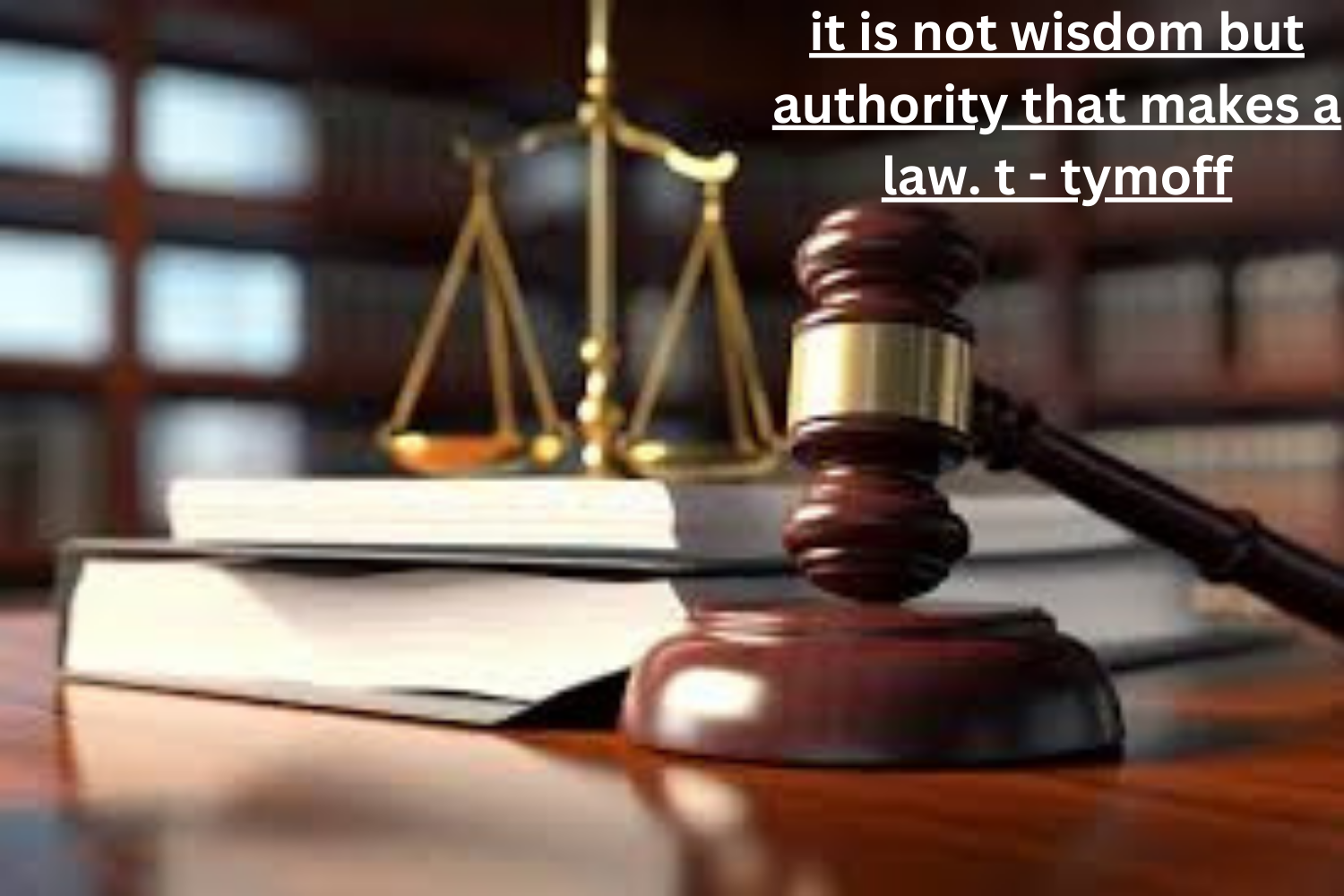What makes a law? Is it the wisdom behind the rules we follow, or is it simply the authority that enforces them? The quote “it is not wisdom but authority that makes a law. t – tymoff,” attributed to T. Tymoff, invites us to ponder this intriguing question. It challenges our perceptions and urges deeper reflection on what governs our society. As we navigate through complex legal systems, understanding this dynamic becomes essential for anyone interested in justice and governance. So let’s delve into the heart of this statement and explore how authority shapes laws—and why wisdom should never be sidelined in such an important process.
The meaning behind the quote
The quote “it is not wisdom but authority that makes a law. t – tymoff” sheds light on the distinction between knowledge and power. At its core, it challenges us to think about who enforces rules and why they hold sway over our lives.
Wisdom suggests deep understanding, compassion, and thoughtfulness. Yet laws often stem from those in positions of control rather than from collective insight or moral reasoning. Authority can impose regulations without consideration for their impact on society.
This perspective raises critical questions about justice and fairness. It nudges us to reflect on whether laws derived solely from authority truly serve the greater good or merely uphold established power structures. The essence of this quote lies in prompting a dialogue about how we define legality versus morality in our communities.
Examining the role of authority in making laws
Authority plays a pivotal role in the creation of laws. It establishes who has the power to enact regulations that govern society. This authority often stems from elected officials, governing bodies, or legal frameworks designed to maintain order.
When decisions are made by those in power, it can bring about swift changes. Laws can be passed quickly to address pressing issues, reflecting the immediate needs of a community or nation.
However, this reliance on authority means that laws may not always align with moral reasoning or public sentiment. Authority figures might prioritize their interests over collective welfare.
In such scenarios, the legitimacy of law becomes questionable. The challenge lies in ensuring that authority is exercised responsibly and ethically while being aware of its limitations when wisdom takes a backseat.
The drawbacks of relying solely on authority in lawmaking
Relying solely on authority in lawmaking can lead to significant issues. When laws are created without thoughtful consideration, they may not serve the populace effectively.
Authority figures often focus on power rather than principles. This can result in legislation that reflects their interests instead of the common good.
Moreover, laws based purely on authority might ignore cultural and social nuances. Such oversight can alienate communities and breed distrust toward the legal system.
Without wisdom guiding decisions, there’s a risk of enacting outdated or irrelevant regulations. These laws may fail to adapt to changing societal needs.
Additionally, an emphasis on authority over reason can stifle public discourse. Citizens might feel discouraged from voicing concerns when they see laws imposed without consultation or rationale behind them.
The importance of wisdom in creating effective laws
Wisdom plays a crucial role in the crafting of effective laws. It’s not just about enforcing rules; it’s about understanding the underlying principles that govern human behavior.
When lawmakers draw upon wisdom, they consider the broader implications of their decisions. This thoughtful approach helps to create laws that resonate with society’s values and needs.
Effective legislation often emerges from a deep comprehension of history, ethics, and social dynamics. Laws born from wisdom are more likely to foster justice and promote harmony among citizens.
Moreover, wise lawmakers recognize the necessity for adaptability. They understand that societal norms evolve, requiring laws to be re-evaluated and adjusted over time.
Wisdom enriches legal frameworks by integrating compassion and foresight into governance. This creates an environment where laws serve as guiding tools rather than mere instruments of authority.
Historical examples of laws made based on authority rather than wisdom
Throughout history, many laws have emerged from the sheer force of authority rather than grounded wisdom. The Prohibition Era in the United States serves as a prime example. Authorities believed that banning alcohol would solve social issues, yet this law led to rampant crime and public disobedience.
In ancient Rome, Emperor Nero enacted laws driven by personal whims. His decisions often prioritized power over reasoned governance. This resulted in significant unrest among citizens who felt disenfranchised.
Similarly, during the Reign of Terror in France, Robespierre imposed strict laws under the guise of safeguarding revolution principles. These measures lacked rational foundation and are remembered for their extreme cruelty.
Such historical instances illuminate how reliance on authority alone can lead to ineffective or unjust legal frameworks. They remind us that without wisdom guiding legislation, societal harm may outweigh any intended benefits.
Balancing authority and wisdom in modern lawmaking
Balancing authority and wisdom in modern lawmaking is crucial for a fair legal system. Authority brings structure, ensuring laws are enforced consistently. However, without wisdom, these laws can become rigid and outdated.
Wisdom introduces flexibility. It encourages lawmakers to consider the human impact of legislation. By integrating diverse perspectives, they craft laws that resonate with the needs of society.
Engagement with communities also plays a vital role. Lawmakers need feedback from those affected by their decisions. This two-way dialogue fosters understanding and empathy.
Moreover, technology can enhance this balance too. Data-driven insights help legislators make informed choices while retaining their authoritative position.
The challenge remains: how do we ensure that both elements work harmoniously? Continuous reflection on our values is essential as societies evolve over time.
Blending authority with wisdom leads to more effective governance and justice for all citizens.
Conclusion: Why both wisdom and authority are necessary for a just legal system
The interplay between wisdom and authority is crucial for a just legal system. While authority provides the structure that enforces laws, wisdom ensures those laws serve justice and common good. A balance must be struck; too much reliance on authority can lead to oppressive regimes, while neglecting it entirely may cause chaos.
History shows us that great legislation often arises from a merging of both elements. Laws crafted with depth of understanding alongside authoritative support tend to foster trust and compliance among the populace. As society evolves, our approach to lawmaking should reflect this dual necessity.
For a truly effective legal framework, lawmakers must wield their power thoughtfully. it is not wisdom but authority that makes a law. t – tymoff They need insight into human behavior, societal needs, and ethical considerations—elements rooted in wisdom—to shape laws that endure through time while maintaining respect for the governing structures.
Embracing both wisdom and authority will pave the way toward a more equitable future where laws not only govern but also uplift communities effectively.



